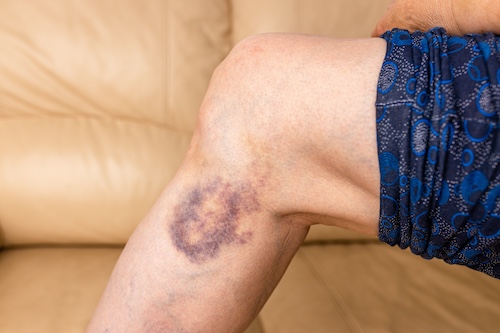At Georgia Spine & Orthopaedics, we specialize in diagnosing and treating injuries resulting from car accidents, workplace incidents, and other trauma-related events. Our team includes orthopedic surgeons, chiropractors, pain management specialists, and physical therapists who work together to provide comprehensive care. With multiple locations across metro Atlanta, including Marietta and Tucker, we offer convenient access to our services. Our goal is to help you recover from your injuries as quickly as possible.
A headache after a car accident might seem like a small problem, especially if you didn’t hit your head. But even without a visible injury, head pain can be a sign of something serious. From mild traumatic brain injuries to whiplash headaches, many conditions can develop hours or days after a motor vehicle collision. Ignoring these symptoms can lead to lasting damage. At Georgia Spine & Orthopaedics, our team of Atlanta car accident doctors provides the evaluations and care needed to identify and treat these hidden injuries early.
In this blog, we explain why headaches after a car accident should never be ignored, the types of headaches you may experience, and why it’s important to see an experienced Atlanta car accident doctor for proper diagnosis and treatment.
Why Do Headaches Happen After a Car Accident?
Headaches after a car accident are common and can be a sign of injury to the head, neck, or brain. Understanding the source of the pain is important for proper treatment and recovery.
Sudden Force on the Neck and Head
A car accident creates a sudden and violent jolt to the body. This force often causes the head to snap forward and backward quickly. The rapid motion can strain or injure the neck muscles, ligaments, and joints. This often results in a whiplash injury, which is a common cause of tension headaches and cervicogenic headaches after a crash.
Brain Movement and Concussion
In many collisions, the brain moves inside the skull due to the impact. This can cause a mild traumatic brain injury such as a concussion. A concussion can lead to a concussion headache, which may start immediately or appear hours later. Other symptoms of a traumatic brain injury may include confusion, dizziness, nausea, or difficulty concentrating.
Nerve Irritation and Occipital Neuralgia
Sometimes the impact from a motor vehicle collision affects the nerves at the base of the skull. This can result in occipital neuralgia, a type of headache pain that feels like sharp or burning pain at the back of the head. This condition happens when nerves are compressed or irritated after a head or neck injury.
Muscle Strain and Tension
Strained muscles in the upper back and neck often lead to tension headaches after a car crash. These headaches can feel like a band of pressure around the head and may last for hours or become constant. The strain on neck muscles from bracing or impact during a crash is a common trigger.
Blood Vessel or Tissue Damage
In more severe cases, a headache after a car accident can signal damage to blood vessels or brain tissue. These types of injuries may involve swelling or bleeding in the brain and require immediate medical attention. A fracture headache may also result from a skull fracture.
Types of Post-Accident Headaches: Know What You’re Feeling
Not all headaches after a car accident are the same. Different injuries lead to different types of headache pain, each with its own symptoms and causes.
Whiplash Headaches
Whiplash headaches are one of the most common types after a motor vehicle accident. They result from the sudden movement of the head and neck during impact. The pain often starts in the neck and moves upward. These headaches may feel dull or throbbing and are usually linked with neck pain, muscle strain, and reduced range of motion.
Concussion Headaches
A concussion headache can follow even a mild blow to the head or a jolt strong enough to shake the brain. These headaches may start right after the accident or show up after a few hours. Common symptoms include pressure in the head, nausea, sensitivity to light or sound, and difficulty concentrating. This type of pain may signal a mild traumatic brain injury and should not be ignored.
Post-Concussion Syndrome Headaches
When a concussion headache lasts for weeks or months, it may become part of post-concussion syndrome. These persistent headaches often come with fatigue, memory problems, sleep disturbances, and irritability. They require medical care and close monitoring by a professional experienced in brain injury treatment.
Migraine Headaches
A traumatic event like a car crash can trigger migraine headaches, even in people who have never had them before. These headaches cause intense throbbing, often on one side of the head. They can be paired with nausea, visual disturbances, and sensitivity to light and sound. Migraines after a motor vehicle crash may suggest deeper neurological issues.
Tension Headaches
Tension headaches feel like a tight band around the head. They often result from stress, muscle tension, or neck injury. After a car accident, these can develop due to both physical strain and emotional stress. Though usually mild, they can become chronic without proper treatment.
Cervicogenic Headaches
A cervicogenic headache starts in the neck and radiates to the front of the head. It often stems from an injury to the cervical spine or upper neck joints. Pain may increase with neck movement or after staying in one position too long. These headaches are often confused with migraines but have different causes and treatment needs.
Occipital Neuralgia Headaches
This headache is caused by irritation or injury to the occipital nerves, located at the base of the skull. Occipital neuralgia headaches create sharp, shooting pain that moves from the neck to the scalp. A car accident can easily cause this if the nerves are compressed or inflamed by trauma or muscle tightness.
Why Ignoring a Headache Can Be Dangerous
A headache after a car accident might seem minor at first, but ignoring it can lead to serious health problems.
Hidden Brain Injuries Can Worsen Over Time
Some brain injuries do not show immediate symptoms. A mild head injury can turn into a long-term issue if left untreated. For example, a closed head injury may involve swelling or bleeding that builds pressure inside the skull. Without care, this can damage brain tissue and affect memory, mood, and motor skills.
Chronic Pain May Develop
Ignoring a constant headache can lead to chronic head pain. Over time, the nervous system becomes more sensitive to pain signals. What starts as a minor issue can become a condition that disrupts daily life. Persistent headaches are harder to treat the longer they last.
Missed Neck or Spine Injuries
Some headaches are caused by problems in the cervical spine or neck muscles. A cervicogenic headache or whiplash injury may not be obvious without a full exam. Delaying treatment allows damage to progress, leading to more severe pain and longer recovery times.
Risk of Long-Term Neurological Issues
If a traumatic brain injury or post concussion syndrome goes untreated, it can lead to serious cognitive and emotional problems. These may include difficulty concentrating, poor memory, mood changes, and fatigue. Seeing an experienced Atlanta car accident doctor can prevent these problems from becoming permanent.
Delayed Treatment Affects Diagnosis and Recovery
Waiting too long to seek medical attention makes it harder to connect the headache to the motor vehicle crash. Without proper records, doctors may miss signs of a severe injury. Early diagnosis allows for quicker and more effective medical treatment.
Seek Treatment From an Experienced Atlanta Car Accident Doctor ASAP!
If you’re experiencing a headache after a car accident, don’t wait to seek help. The team at Georgia Spine & Orthopaedics specializes in diagnosing and treating post-accident injuries, including headaches that may indicate underlying issues like traumatic brain injury or whiplash.
Schedule an appointment with us at 678-929-4494 today!






